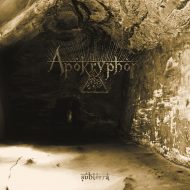 The background information doesn’t help here, with a dry, long-winded and cerebral explanation of the ancient origins of the band name and the album’s theme, and the foundation of the band from a previous project with whom Apokryphon are not comparable, so I won’t mention them. And other stuff. I’ll confine this introduction to saying that this Apokryphon is not to be mixed up with the American Apocryphon, and that “Subterra” is musically “rooted in black metal, decorated with oriental spices”. Now that does sound interesting.
The background information doesn’t help here, with a dry, long-winded and cerebral explanation of the ancient origins of the band name and the album’s theme, and the foundation of the band from a previous project with whom Apokryphon are not comparable, so I won’t mention them. And other stuff. I’ll confine this introduction to saying that this Apokryphon is not to be mixed up with the American Apocryphon, and that “Subterra” is musically “rooted in black metal, decorated with oriental spices”. Now that does sound interesting.
Indeed, it all starts with mystical and haunting Middle Eastern tones. The drum beats. The build up is intriguing. Finally, after 7 minutes, “Evangelion of the Serpent” bursts into frenzied, dirty black metal. That wasn’t so intriguing. The switch was crude. Here were two distinct worlds. To be honest, I was mystified. It ends as obscurely as it began. At least the start was interesting if long-winded. Well that was 12 minutes of my life wasted but at least there’s plenty more. The underproduced roars to the black metal furious black metal strain of “The Naasene Psalm” don’t however take this forward, for me anyway. It’s as if Ophis, the inspiration behind Apokryphon, is trying to recreate a raw sound – why? “Sand Ghosts” replicates the old school black metal and the grainy sound. It’s like watching a black and white tv when the technology has moved on. I suppose there’s an atmosphere – like being caught in a sandstorm, I suppose. There’s a lot of indistinct roaring, and a dirty wall of sound. If this is an adventure as claimed, then I’m missing out. That ended pointlessly, and we move on to “The Great Ignorance”. This, like the first track, comprises spooky oriental ambience and the beat of what sounds like a table as the sound waves drift through in their ominous way. I liked this. It has originality and flavour. Here at last I am being transported to a world of eastern mysticism.
“Anthropos” drifts about, and was about to die a death when a sharp instrumental chorus strikes up. It’s a little like early Burzum in its malevolent intensity but it seems to come from a strange, lost world. “Nag Hammadi” takes a while to get going. I’d got used to this. The start sounds like a pre-production experiment. Clarity of a sort takes over, and the piece expands to a fiery expanse of black metal. It’s strong stuff, to be fair. The 11 minute “Taxidermia” includes a dramatic spoken dialogue. As I didn’t know what was going on, this just sounded like an argument between a man and a woman, while waves of deep cosmic mystical tones ran through the background. Something had to happen as the people seemed to run out of things to say, so if in doubt, let’s revert to a volley of intense black metal, and that’s what happened for the rest of it. Having failed to take inspiration from what had gone so far, it was unlikely that the remaining title track was going to provide a climax. Middle eastern instruments play above a solemn symphony. For once it does blend into the anticipated black metal, and the two musical styles come together in powerful fusion. Again it’s a little Burzum like. On “Subterra” bashes remorselessly to the end of this album, to which I’m afraid I hadn’t warmed.
For me, although “Subterra” had occasional moments of interest, it was one piece “The Great Ignorance” which saved the day. As a whole, I didn’t get this. Some of it was original, some of it wasn’t. I have no doubt that the theme of “Subterra” was a worthy idea but musically I found it too obscure and unrewarding. Ultimately this album was lost on me. I found it mixed up and lacking in coherence, thus taking what little shine there was off it.
(4/10 Andrew Doherty)

Leave a Reply